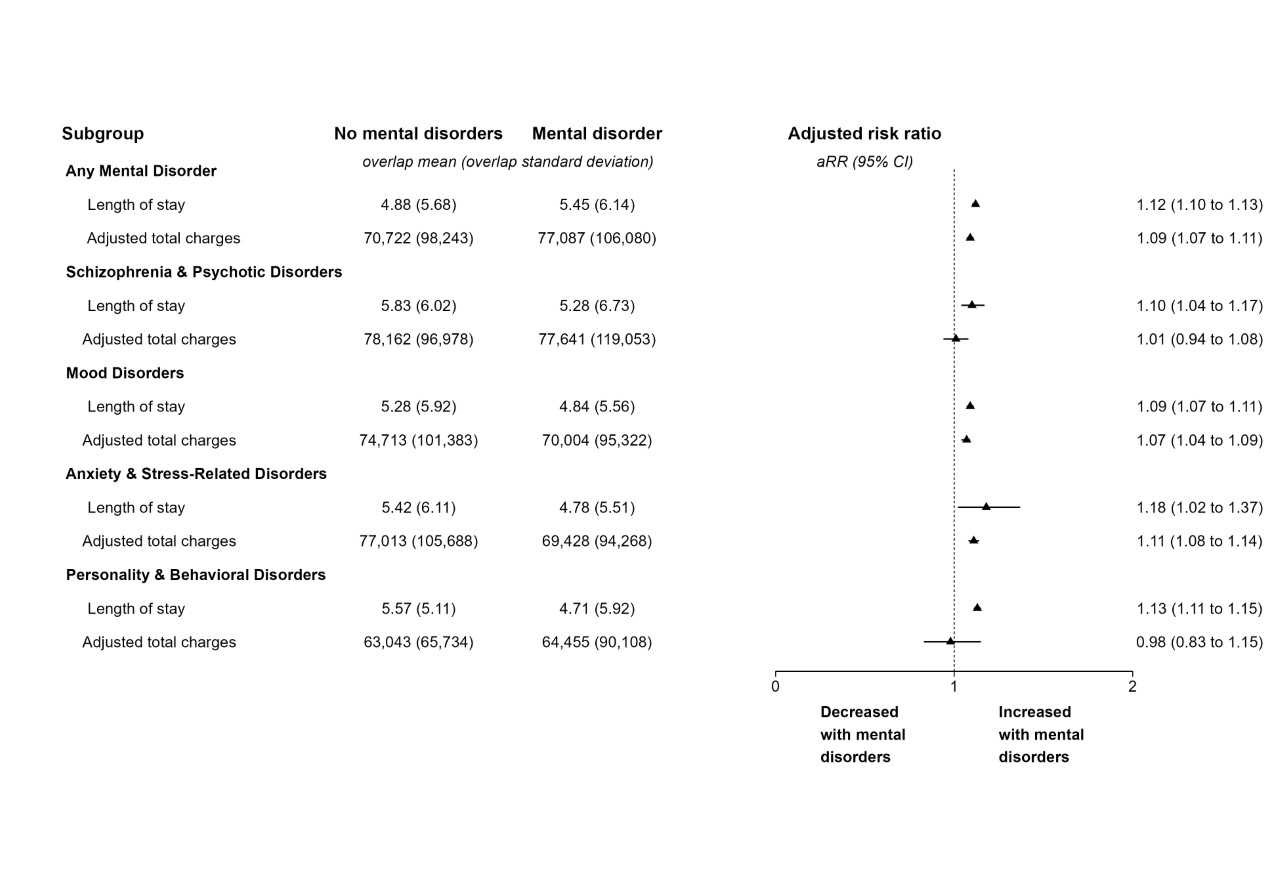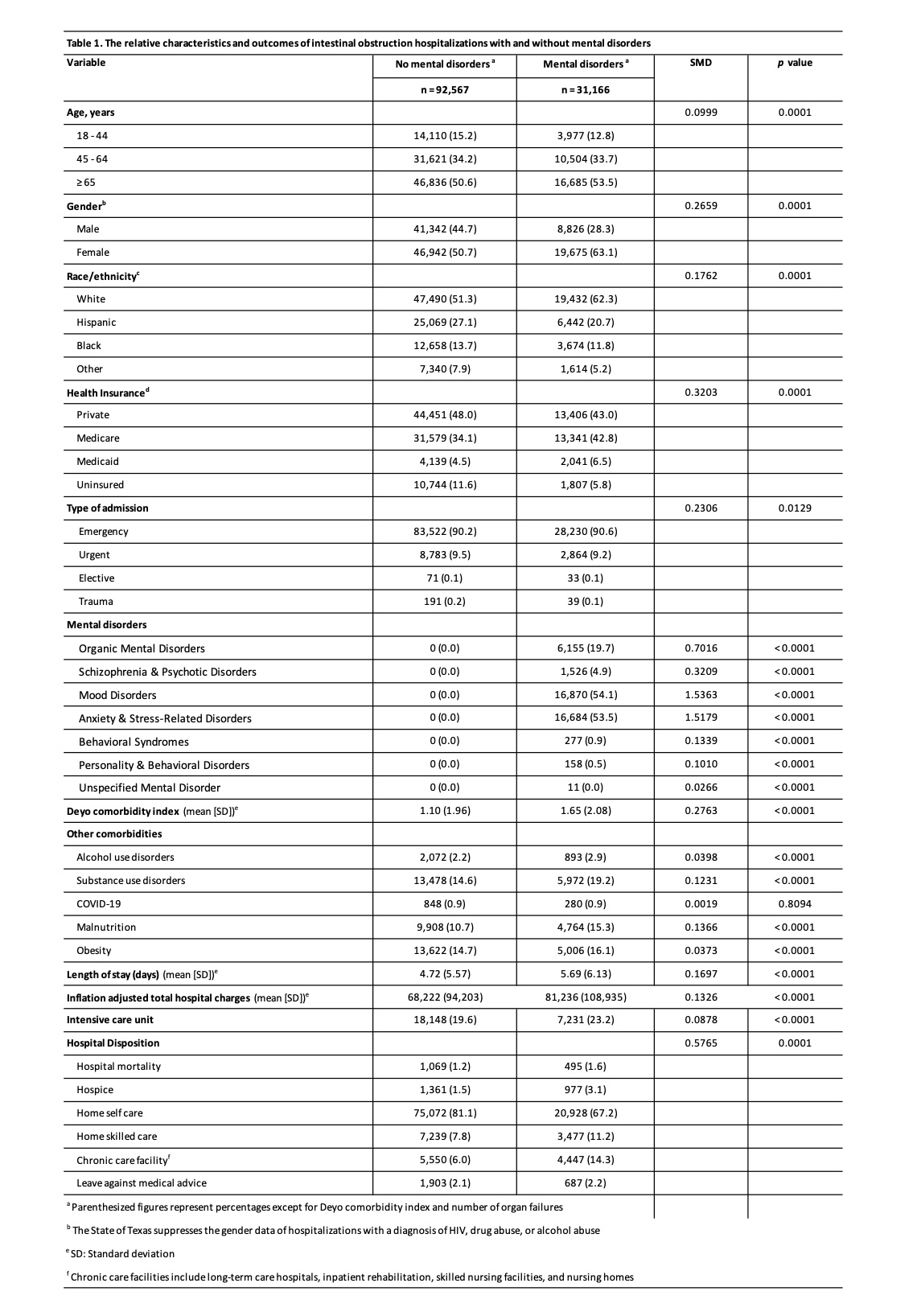Tuesday Poster Session
Category: Practice Management
P6187 - The Impact of Mental Health Disorders on Resource Utilization Among Intestinal Obstruction Hospitalizations
Tuesday, October 28, 2025
10:30 AM - 4:00 PM PDT
Location: Exhibit Hall
.jpg)
Anjul Verma, MD (he/him/his)
Texas Tech University Health Sciences Center
Odessa, TX
Presenting Author(s)
Muhammad Saad, MD1, Anjul Verma, MD2, John Garza, PhD3, Shailesh Jain, MD1, Madhuri Jakkam-Setty, MD2, Guy Loic Nguefang Tchoukeu, MD2
1Texas Tech University Health Sciences Center, Midland, TX; 2Texas Tech University Health Sciences Center, Odessa, TX; 3Texas Tech University Health Sciences Center - Permian Basin, Odessa, TX
Introduction: Mental health disorders are linked to a higher risk of adverse clinical outcomes in individuals with physical illnesses. While mental health alone may not significantly impact outcomes in bowel obstruction cases, its interaction with factors such as race and insurance status has been associated with worse outcomes. This study investigates the impact of mental health disorders on resource utilization among adult patients hospitalized for intestinal obstruction(IO) in Texas.
Methods: We used de-identified and statewide data to conduct a population-based cohort study of non-elective admissions of Texas residents aged 18 years or older with a principal diagnosis of IO admitted to acute care hospitals from 2016 to 2023. Hospitalizations transferred to or from another hospital were excluded. IO was identified using ICD-10 codes selected from Clinical Classification Software Refined Category DIG012: Intestinal obstruction and ileus. The exposure was mental health disorders(MHD) identified using ICD-10 codes from CCSR Chapter MBD: Mental, behavioral, and neurodevelopmental disorders. We applied propensity score overlap weighting. Sensitivity analyses included types of MHD. Results are reported as adjusted risk difference and 95% confidence interval (aRD [95%CI]).
Results: Of 123,733 hospitalizations, 31,166 (25.2%) had a psychiatric illness. Patients with MHD were more often female (63.1% vs 50.7%) and had a higher comorbidity index (mean[standard deviation] 1.65[2.08] vs 1.10[1.96]). Mood disorders (13.6%) and anxiety disorders (13.5%) were the most common diagnoses. Patients with a MHD had longer length of stay (5.7[6.1] days vs 4.7[5.6] days) and higher total charges ($81,236[$108,935] vs $68,222[$94,203]). After overlap weighting, length of stay aRD 0.57 days (95% CI 0.48 to 0.65) and total charges aRD ($6,365 [$4,848 to $7,881]) remained associated with MHD. Anxiety disorders had the largest impact on resource utilization, as evidenced by a relative risk (aRD) of 0.86 (95% CI 0.04 to 1.68) and total charges (aRD) of $7,585 (95% CI $5,769 to $9,401).
Discussion: Among hospitalized patients with intestinal obstruction, those with mental health disorders were associated with longer hospital stays, higher resource utilization, and hospital charges. These highlight the importance of an integrated approach to address the psychiatric and medical needs of patients for better outcomes and reducing healthcare burden.

Figure: The relative characteristics and outcomes of intestinal obstruction hospitalizations with and without mental disorders

Figure: Forest plot for the subgroup analysis
Disclosures:
Muhammad Saad indicated no relevant financial relationships.
Anjul Verma indicated no relevant financial relationships.
John Garza indicated no relevant financial relationships.
Shailesh Jain indicated no relevant financial relationships.
Madhuri Jakkam-Setty indicated no relevant financial relationships.
Guy Loic Nguefang Tchoukeu indicated no relevant financial relationships.
Muhammad Saad, MD1, Anjul Verma, MD2, John Garza, PhD3, Shailesh Jain, MD1, Madhuri Jakkam-Setty, MD2, Guy Loic Nguefang Tchoukeu, MD2. P6187 - The Impact of Mental Health Disorders on Resource Utilization Among Intestinal Obstruction Hospitalizations, ACG 2025 Annual Scientific Meeting Abstracts. Phoenix, AZ: American College of Gastroenterology.
1Texas Tech University Health Sciences Center, Midland, TX; 2Texas Tech University Health Sciences Center, Odessa, TX; 3Texas Tech University Health Sciences Center - Permian Basin, Odessa, TX
Introduction: Mental health disorders are linked to a higher risk of adverse clinical outcomes in individuals with physical illnesses. While mental health alone may not significantly impact outcomes in bowel obstruction cases, its interaction with factors such as race and insurance status has been associated with worse outcomes. This study investigates the impact of mental health disorders on resource utilization among adult patients hospitalized for intestinal obstruction(IO) in Texas.
Methods: We used de-identified and statewide data to conduct a population-based cohort study of non-elective admissions of Texas residents aged 18 years or older with a principal diagnosis of IO admitted to acute care hospitals from 2016 to 2023. Hospitalizations transferred to or from another hospital were excluded. IO was identified using ICD-10 codes selected from Clinical Classification Software Refined Category DIG012: Intestinal obstruction and ileus. The exposure was mental health disorders(MHD) identified using ICD-10 codes from CCSR Chapter MBD: Mental, behavioral, and neurodevelopmental disorders. We applied propensity score overlap weighting. Sensitivity analyses included types of MHD. Results are reported as adjusted risk difference and 95% confidence interval (aRD [95%CI]).
Results: Of 123,733 hospitalizations, 31,166 (25.2%) had a psychiatric illness. Patients with MHD were more often female (63.1% vs 50.7%) and had a higher comorbidity index (mean[standard deviation] 1.65[2.08] vs 1.10[1.96]). Mood disorders (13.6%) and anxiety disorders (13.5%) were the most common diagnoses. Patients with a MHD had longer length of stay (5.7[6.1] days vs 4.7[5.6] days) and higher total charges ($81,236[$108,935] vs $68,222[$94,203]). After overlap weighting, length of stay aRD 0.57 days (95% CI 0.48 to 0.65) and total charges aRD ($6,365 [$4,848 to $7,881]) remained associated with MHD. Anxiety disorders had the largest impact on resource utilization, as evidenced by a relative risk (aRD) of 0.86 (95% CI 0.04 to 1.68) and total charges (aRD) of $7,585 (95% CI $5,769 to $9,401).
Discussion: Among hospitalized patients with intestinal obstruction, those with mental health disorders were associated with longer hospital stays, higher resource utilization, and hospital charges. These highlight the importance of an integrated approach to address the psychiatric and medical needs of patients for better outcomes and reducing healthcare burden.

Figure: The relative characteristics and outcomes of intestinal obstruction hospitalizations with and without mental disorders

Figure: Forest plot for the subgroup analysis
Disclosures:
Muhammad Saad indicated no relevant financial relationships.
Anjul Verma indicated no relevant financial relationships.
John Garza indicated no relevant financial relationships.
Shailesh Jain indicated no relevant financial relationships.
Madhuri Jakkam-Setty indicated no relevant financial relationships.
Guy Loic Nguefang Tchoukeu indicated no relevant financial relationships.
Muhammad Saad, MD1, Anjul Verma, MD2, John Garza, PhD3, Shailesh Jain, MD1, Madhuri Jakkam-Setty, MD2, Guy Loic Nguefang Tchoukeu, MD2. P6187 - The Impact of Mental Health Disorders on Resource Utilization Among Intestinal Obstruction Hospitalizations, ACG 2025 Annual Scientific Meeting Abstracts. Phoenix, AZ: American College of Gastroenterology.
